СТРАТЕГИЧЕСКОЕ ПАРТНЕРСТВО РОССИИ, ИНДИИ
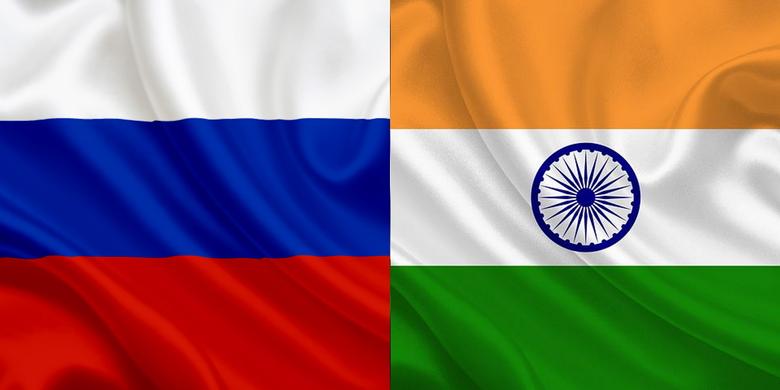
МИД РОССИИ - 01.04.2022 - Ответы Министра иностранных дел Российской Федерации С.В.Лаврова на вопросы СМИ по итогам переговоров с Министром иностранных дел Республики Индии С.Джайшанкаром, Нью-Дели, 1 апреля 2022 года
Вопрос (перевод с английского): Расскажите, как прошли переговоры? Как Россия может поддержать Индию в связи с угрозами региональной безопасности?
С.В.Лавров (перевод с английского): Провели переговоры, характеризующиеся отношениями, которые мы развивали с Индией в течение многих десятилетий – привилегированного стратегического партнерства. Некоторое время назад так их назвали наши индийские друзья. Это была основа для продвижения двустороннего сотрудничества во всех областях: экономической, военной, технической, гуманитарной, инвестиционной и многих других.
Верю, что внешняя политика Индии характеризуется независимостью и концентрацией на законных национальных интересах. Такой же политический базис существует и в России. Это делает нас хорошими друзьями и партнерами в важнейшей части международных отношений.
Мы всегда уважали интересы друг друга и старались приспособиться к обоюдным «запросам». Это и было главной темой наших обсуждений. Они затрагивали все двусторонние аспекты двустороннего сотрудничества в международных и региональных вопросах. Ситуация в регионе неидеальна, как и везде в мире. Поддерживаем устремления Индии консолидировать страны региона и продвигать взаимовыгодные проекты в Южной Азии.
Вопрос: Долгое время Россия выстраивала тесные отношения со странами Запада. Сегодня экономическое сотрудничество фактически разрушено. Вы осуществляете Ваше первое (после начала спецоперации на Украине) азиатское турне. Сначала был Китай, а сейчас Индия. Значит ли это, что именно там Россия будет искать недостающие рынки сбыта нефти и газа?
С.В.Лавров: Что касается нынешнего турне (Китай и Индия), считаю, это вполне естественным маршрутом. Мы являемся тесными партнерами с обеими странами. Втроём участвуем в целом ряде международных форматов. Это БРИКС, ШОС, структуры, которые сложились вокруг АСЕАН: Восточноазиатские саммиты (ВАС), Региональный форум АСЕАН по безопасности (АРФ). Есть наша «тройка» – РИК (Россия, Индия, Китай). С того момента, как она сформировалась (это уже больше двадцати лет), провели пару десятков заседаний министров иностранных дел. Последнее заседание состоялось осенью 2021 г. Был принят развернутый документ, отражающий наши общие подходы к целому ряду международных проблем. Он составляет основу для дальнейших действий на этом направлении.
В Китае мы с моим коллегой, Министром иностранных дел КНР Ван И, обсуждали дальнейшую деятельность объединения РИК. Сегодня мы с С.Джайшанкаром говорили, как эту «тройку» развивать и активнее использовать в интересах стабилизации международных отношений, обеспечения равноправия в международных делах. Это особенно актуально, учитывая, что сейчас все три страны – Россия, Индия и Китай – являются членами Совета Безопасности ООН. Так что планов у нас немало.
Насчет рынков сбыта – мы никогда не навязывали кому-либо свою продукцию. Если у стран, которые заинтересованы торговать с Россией, есть конкретные потребности расширить номенклатуру поставок, всегда готовы искать договоренности на основе баланса интересов и взаимной выгоды.
Вопрос: По поводу возможных переговоров В.В.Путина и В.А.Зеленского. У Вас есть понимание, в какой стране они могут пройти? Переговоры, начавшиеся в Белоруссии, продолжились в Турции. Кроме этого свои посреднические услуги предлагал Израиль. Когда может произойти парафирование мирного договора между главами МИД России и Украины?
С.В.Лавров: Здесь нет каких-либо окончательно одобренных планов. Они должны продолжиться. Последний раунд переговоров комментировался нашими переговорщиками в Стамбуле, где впервые украинская сторона «положила на бумагу» своё видение договоренностей, которых необходимо достичь. Они должны сначала сформироваться. У нас готовится реакция. Там есть движение вперёд, прежде всего в том, что касается признания невозможности Украины быть блоковой страной, «искать счастье» в Североатлантическом альянсе. Безъядерный, внеблоковый, нейтральный статус – это то, что сейчас уже осознаётся как абсолютная необходимость. Равно как мы увидели гораздо больше понимания ещё одной реальности. Имею в виду ситуацию с Крымом и в Донбассе. Относительно дальнейших потенциальных контактов – они сейчас прорабатываются. Будут объявлены дополнительно.
Вопрос (перевод с английского): Какие ключевые темы Вашей беседы с Министром иностранных дел Индии С.Джайшанкаром? Обсуждали ли Вы внедрение эффективного механизма расчетов в рублях и рупиях для двусторонней торговли, включая оплату Индией покупок российской нефти? Затрагивался ли вопрос сотрудничества России, Индии и Китая на переговорах в Пекине и Нью-Дели?
Как Вы оцениваете опасения в Индии по поводу возможной задержки поставок российской военной техники в Индию, включая С-400 из-за кризиса на Украине?
С.В.Лавров (перевод с английского): Что касается использования рублей и рупий в торговых финансовых сделках, хотел бы напомнить, что много лет назад мы начали отходить в наших отношениях с Индией, Китаем и многими другими странами от использования долларов и евро, чтобы больше использовать национальную валюту. В нынешних обстоятельствах эта тенденция будет естественным образом усиливаться. Будем готовы обеспечить Индию любыми товарами, которые она захочет закупить. У нас хорошие отношения между министрами торговли и финансов. Это путь в обход искусственных препятствий, созданных незаконными односторонними санкциями Запада.
Что касается суверенного военно-технического сотрудничества, нет сомнения, что решение будет найдено. Соответствующие министерства уже работают над этим.
Вопрос: США оказывают давление на Индию с целью ее вовлечения в антироссийскую кампанию. Сказывается ли это давление на взаимоотношениях России и Индии? Есть ли уверенность, что партнерство наших стран не пострадает?
С.В.Лавров: У меня такая уверенность есть. Потому что это партнерство не зависит от каких-то конъюнктурных соображений. Тем более оно не зависит от незаконных методов диктата и шантажа. По отношению к таким странам как Россия, Индия, Китай и многим другим абсолютно бессмысленно применять подобного рода политику. Это означает, что люди, которые такую политику предлагают, реализуют и навязывают своё видение всем остальным, не очень хорошо разбираются в национальной идентичности тех стран, с которыми пытаются разговаривать языком шантажа и ультиматумов.
Вопрос (перевод с английского): Как Вы смотрите на позицию Индии в отношении продолжающейся войны? Что Вы сказали Вашему индийскому коллеге? Предлагали ли Вы поставки нефти в Индию?
Работают ли Индия и Россия над соглашением о расчетах в рупиях и рублях? Окажет ли продолжающийся кризис какое-либо влияние на будущие поставки высокотехнологичного оружия, такого как С-400?
Вы и Президент В.В.Путин находитесь под санкциями США, ЕС?
С.В.Лавров (перевод с английского): Все российские граждане попали под санкции США, ЕС. Это не сюрприз. Западные коллеги показали своё истинное лицо. Уверен, что большинство стран на Земле осознают, что происходит на самом деле и понимают недопустимость действий, демонстрируемых нашими ненадежными партнерами.
Что касается позиции Индии в отношении происходящего на Украине. Вы назвали это войной, но это неправда. Это спецоперация, которая проводится максимально аккуратно, чтобы не нанести никакого ущерба гражданской инфраструктуре. Военные объекты становятся мишенью. Цель заключается в том, чтобы лишить киевский режим возможности представлять какую-либо угрозу для России. Этот военный потенциал укреплялся в течение многих лет США и другими странами-членами НАТО, которые хотели разорвать связь России с нашими соседними и приграничными странами.
Я уже упоминал о рублях и рупиях. Этот процесс продолжается уже много лет. Причиной перехода к расчётам в национальных валютах является абсолютно ненадежный характер наших западных коллег.
Мы не хотим полагаться на систему, которая может быть закрыта в любой момент, и чьи хозяева могут украсть у нас деньги.
Уже говорил о поставках нефти и высокотехнологичной продукции в Индию. Если Индия хочет у нас что-либо купить, то мы готовы это обсуждать и достигать взаимовыгодных форм сотрудничества.
Вопрос (перевод с английского): В связи с введёнными западными санкциями будет ли Россия увеличивать объём торговли с Индией и в каких областях?
С.В.Лавров (перевод с английского): Это естественный ход вещей. Мы открыты на всех азимутах для взаимовыгодных, взаимоуважительных отношений, в том числе в торговле, инвестиционной сфере и других областях. Когда на одном из азимутов наступает ничем неоправданное озлобление и реакция, которые выходят за все разумные рамки, то объективно и естественно, что партнёры на других направлениях начинают играть бо́льшую роль в твоей торговле и экономической деятельности. Ничего удивительного нет. Это уже происходило. Санкции не вчера появились. Долгие годы (десять лет минимум) находимся под интенсивными санкциями Запада и целого ряда других стран. У нас уже есть опыт, как жить в этих условиях. Причём жить так, чтобы было хорошо и нам, и нашим партнёрам. Уверяю вас, что так оно и будет.
Вопрос (перевод с английского): Вас беспокоит то, что западные страны думают о русском плане «Б», предполагающем платить за газ в рублях? Франция и Германия заявили, что они отвергают подобные предложения Кремля, так как это означает нарушение текущих контрактов. Что Вы думаете на сей счёт?
С.В.Лавров (перевод с английского): Что касается поставок газа в Европу. Президент России В.В.Путин подробно обо всём рассказал. Был подписан Указ, который предполагает схему оплаты, приемлемую для западных стран. Мы не можем использовать старую, так как Запад платил нам в своей валюте, а потом арестовал наши счета. Это как «золотая лихорадка» в США. Страна была основана теми, кто сбежал из Европы, потому что преследовался там законом. Представленная нами схема – прозрачная. Она позволяет нам получать оплату за газ в рублях. В этом и состоит наша цель.
Вопрос (перевод с английского): Индия не заняла «ястребиную» позицию по отношению к России, несмотря на давление западных стран, так как она зависит от поставок сырой нефти по сниженным ценам комплексов С-400 и «калашниковых»?
С.В.Лавров (перевод с английского): Не могу себе представить, что Индия займёт такую позицию. Даже если на неё оказывается давление. Мы уважаем верность Индии своим основным принципам. Внешняя политика Индии основывается на законных национальных интересах этой страны и её народа. Это всё, что я могу сказать на этот счёт.
Вопрос (перевод с английского): Говорят, что Индия может выступить посредником для переговоров между Москвой и Киевом. Более того, говорят, что Премьер-министр Индии Н.Моди может стать посредником переговоров между президентами России и Украины. Обсуждали ли эту тему и насколько это возможно?
С.В.Лавров (перевод с английского): Не слышал таких разговоров. Взвешенная позиция Индии, которая не подвержена влиянию в результате методов шантажа и диктата, вызывает у нас уважение. Такую позицию занимают и многие другие серьёзные страны, с которыми бесполезно таким языком разговаривать. Возможно, Индия увидит для себя какую-то роль в том, чтобы обеспечить решение проблем, послуживших началом нынешней ситуации, – проблем равной и неделимой безопасности в Европе, – поможет утвердить принципы справедливости в этих делах и объяснит нашим общим партнёрам совершенно тупиковый характер их попыток отказать России в праве на гарантии своей безопасности.
Мы за то, чтобы гарантии безопасности были предоставлены Украине, всем европейским странам, России в соответствии с теми документами, которые многие годы принимались в рамках ОБСЕ и провозгласили принцип, что никакая страна не будет свою безопасность укреплять за счёт безопасности других. Именно здесь лежит корень всех проблем.
Запад игнорировал свои обязательства и создавал из России прямую военную и идеологическую угрозу, потакая неонацистским тенденциям и практикам на территории Украины. Если Индия с её позицией справедливости и рациональных подходов к решению международных проблем сможет поддержать такие процессы, думаю, что никто не будет против.
Вопрос: Уже не первую неделю приходят сообщения со всего мира, что русофобские настроения захлёстывают целые регионы. Люди страдают от того, что называется «средневековье», от того, в чём они не виноваты. Как МИД реагирует на это? Может, будут сформированы единые центры сбора информации, центры помощи? Что будет происходить дальше на этом направлении и что нужно ещё сделать?
С.В.Лавров: Мы не раз комментировали ситуацию. Она действительно напоминает средневековье, настоящий русофобский шабаш. Как будто все предшествующие десятилетия Запад маскировался под вежливого, воспитанного партнёра на международной арене. На самом деле за такой внешне приличной маской скрывалось его истинное лицо. Оно сейчас проявилось в таких масштабах, о которых даже никто не мог подумать. Всё русское подвергается остракизму и запретам.
У нас налажена работа по регистрации всех случаев подобного рода. Используем инструменты, которые существуют в нашей государственной системе, ресурсы Следственного Комитета, Генеральной Прокуратуры и других ведомств.
Активно задействован Фонд поддержки и защиты прав соотечественников, проживающих за рубежом. Он уже давно работает в десятках стран и помогает организовывать правовую помощь соотечественникам, оказавшимся в непростой ситуации.
Нынешняя история требует глобальных усилий на уровне международных организаций. Они должны подчеркнуть недопустимость подобных «действий» со стороны наших западных партнеров. Существует дискриминация, растоптаны все «ценности», которыми Запад «кичился» многие годы (презумпция невиновности, неприкосновенность собственности, правила свободного рынка и т.д.). Уже не говорю про то, что делают с религией и Русской православной церковью не только на Украине, но и в странах Евросоюза, считающих себя «цивилизованными». Этот разговор «назрел». Всё происходящее прямо подрывает обязательства устроителей этих «акций» по Уставу ООН, ОБСЕ. Без этого разговора не сможем преодолеть то состояние, в которое Запад «загоняет» не только отношения с Россией, но и международные. Это сигнал всем нам.
За последние пару лет США окончательно пресекли все попытки Европы стремиться к некой самостоятельности, стратегической автономии. Единичные голоса, раздающиеся в частности из Франции, уже ничего не решают. Германия полностью смирилась с тем, что она является союзником США, слепо следующим в американской «колее». Делается всё, чтобы воссоздать однополярный мир и провозгласить этот процесс «борьбой демократий с автократиями». Какая это демократия? В этом состоянии во главе с Вашингтоном они сами, в комплексе, стали автократией на международной арене. Исповедуют вседозволенность для себя.
Если США покажется, что где-то (как это было в Ираке, Ливии, Сирии, за тысячи километров от их берегов) «вдруг» возникают некие «угрозы» (как правило, они потом оказываются фейками или основанными на ложных доказательствах) Вашингтон «имеет право» делать, что хочет: убивать сотни тысяч гражданских лиц, сравнивать города с землей (например, г.Ракка в Сирии). Этот менталитет будет пронизывать дальнейшую деятельность Запада во всех регионах, если его не остановить.
Если кто-то еще, не только Россия, видит прямую угрозу, воплощенную в вооружениях, военно-биологических программах (как теперь выясняется), создании иностранных военных баз на территории соседнего государства (в данном случае прямо на границах с нашей страной), Запад считает это неприемлемым. Как и то, что Россия начинает отстаивать собственные интересы. Это гораздо глубже и шире, нежели просто специальная военная операция на Украине, обеспечение её нейтралитета под коллективно принятыми гарантиями безопасности. Это вопрос мироустройства, в котором все нормы приличия, международного права и собственные «ценности» (Запад внедрял их в контексте своей модели глобализации), были попраны самим же Западом.
От этого разговора не уйти. Его необходимость понимают в Китае, Индии и в других странах. Читал выступление Министра иностранных дел Индии С.Джайшанкара на вчерашнем мероприятии, посвященном индийско-британскому взаимодействию. Он отметил, что вопросы, возникшие в международных делах, затрагивают существо миропорядка, который должен претерпеть изменения, стать равноправным, многополярным, без каких-либо суверенов и диктаторов.
Вопрос (перевод с английского): Почему Вы приехали в Индию? Против России ввели много санкций, в том числе запрет на использование системы SWIFT. Будете ли Вы рекомендовать Индии и другим дружественным странам использовать альтернативные системы?
С.В.Лавров: Потому что мы друзья и регулярно обмениваемся визитами.
Что касается системы SWIFT, то мы много раз отмечали, что ненадежность наших западных партнеров становится все более очевидной. Развиваем национальные механизмы в России. Центральный банк построил свою систему. В Индии тоже есть своя – «РуПэй». Очевидно, что всё больше транзакций будут осуществляться с помощью этих систем в обход долларов и других валют, которые оказались полностью ненадежными.
-----
STRATEGIC PARTNERSHIP OF RUSSIA, INDIA

MFA OF RUSSIA - 1 April 2022 18:13 - Foreign Minister Sergey Lavrov’s answers to media questions following talks with Minister of External Affairs of India Subrahmanyam Jaishankar, New Delhi, April 1, 2022
Question: How would you assess your talks with the minister? How can Russia support India at a time when it faces security challenges from its neighbours?
Sergey Lavrov: The talks can be characterised by the relations which we have developed with India for many decades. Our relations are a strategic partnership, even a specially privileged strategic partnership, as our Indian friends called it some time ago. And this was the basis on which we have been promoting our cooperation in all areas: the economy, military-technical, humanitarian, investment and many other fields.
And I believe that India’s foreign policy is characterised by independence and by concentrating on its own legitimate national interests. The same policy foundation exists in the Russian Federation, and this makes us, as big countries, good friends and old partners, an important part of international relations.
We have always respected each other’s interests and we always tried to accommodate the interests of the other. This was the underlying approach to our discussion, which covered all bilateral areas of cooperation, and covered, of course, international and regional issues. The situation in the region is not perfect, as with any other place in the world. We support Indian efforts to consolidate the regional countries and promote mutually beneficial projects in South Asia in particular.
Question: For a long time, Russia has been building close relations with the Western countries. Today, economic cooperation has been virtually destroyed. You are on your first Asian tour since the start of the special operation in Ukraine. First you visited China, and now India. Does this mean Russia will seek replacement markets for oil and gas in this region?
Sergey Lavrov: I believe China and India are natural destinations for this tour. Both countries are Russia’s close partners. The three of us participate in a number of international formats, including BRICS, the SCO, and formats that have developed around ASEAN: the East Asia Summit (EAS) and the ASEAN Regional Security Forum (ARF). There is also the RIC (Russia, India, China) format. RIC Foreign Ministers have met a couple of dozen times since its inception (more than twenty years ago). The last meeting took place in the autumn of 2021. A detailed document was adopted reflecting our common approaches to a number of international issues. It paves the way for further actions in this direction.
In China, my colleague, Chinese Foreign Minister Wang Yi, and I discussed the further activities of the RIC association. Today, Minister Subrahmanyam Jaishankar and I discussed ways to develop this format and use it more intensively in the interests of stabilising international relations and ensuring equality in international affairs. This is especially relevant given that all the three countries – Russia, India and China – are members of the UN Security Council now. So we have many plans.
As for markets, we have never imposed our products on anyone. If countries that are interested in trade with Russia have specific needs and want to expand their range of imports, we are always ready to make agreements based on a balance of interests and mutual benefit.
Question: A question regarding potential talks between Vladimir Putin and Vladimir Zelensky. Do you know which country they might be held in? The talks started in Belarus and were continued in Turkey. Israel offered mediation as well. When might a peace treaty be initialised between the Russian and Ukrainian foreign ministries?
Sergey Lavrov: There are no approved plans for this. The talks must continue. Our negotiators commented on the latest round of talks in Istanbul where the Ukrainian representatives “put on paper,” for the first time, their vision of the agreement that must be reached. This needs to take shape first. We are preparing a response. There is some progress there. Above all, they recognised that Ukraine cannot be a bloc country, that it cannot “find happiness” by joining the North Atlantic Alliance. Nuclear-free, bloc-free, neutral status is already recognised as an absolute must. Likewise, we saw much more understanding of one more reality. I am referring to the situation with Crimea and Donbass. We are still working on the next potential meetings. We will announce updates on this.
Question: What were the key subjects of your conversation with Indian Foreign Minister Jaishankar? Did you discuss the introduction of an efficient rouble and rupee settlement mechanism for bilateral trade, including India’s purchases of Russian oil? Was the issue of cooperation between Russia, India and China touched on at the talks in Beijing and in New Delhi?
How do you assess India’s fears of a possible delay in supplying Russian military equipment, including the S-400, due to the crisis in Ukraine?
Sergey Lavrov: Well, as regards the use of the rouble and rupee in our financial and trade transactions, I would like to remind you that many years ago we started moving away from the dollar and the euro to the more extensive use of national currencies in our relations with India, with China and many other countries.
Under the circumstances, I believe this trend will be intensified, which is only natural and obvious. We are ready to supply India with any items it wants to purchase. I already referred to this. We have very good relations between the trade ministries, the ministries of finance, and I have no doubt that this would be a way to bypass the artificial impediments that have been created by the illegal unilateral sanctions by the West.
This relates also to the area of military-technical cooperation. We have no doubt that a solution would be found; the respective ministries are working on this.
Question: The United States is exerting pressure on India to involve it into an anti-Russia campaign. Does this pressure affect relations between Russia and India? Are you confident that our countries’ partnership will not be damaged?
Sergey Lavrov: I am confident about this because our partnership does not depend on opportunistic considerations. Moreover, it does not depend on illegal methods of dictate and blackmail. It is absolutely pointless to apply such a policy to countries like Russia, India, China, and many others. This shows that those who are offering and implementing such a policy, who impose it on others do not have a good understanding of the national identity of the countries they are trying to talk to in a language of blackmail and ultimatums.
Question: How do you look at India’s position on this ongoing war? What did you tell your Indian counterpart? Did you offer oil supplies to India?
Have you reached a compromise on the rupees and roubles arrangement for payments?
Even Mr Putin and you are sanctioned by the US and the EU: How do you look at this scenario?
Sergey Lavrov: Every Russian has been sanctioned by the US and the European Union, so there is no surprise to me. The Western colleagues just made their real face known these days. I do not have the slightest doubt that most countries on Earth understand what is going on and understand the inadmissibility of the manners which are being demonstrated by our Western – very, very unreliable – partners.
As regards India’s position on the developments in Ukraine, – you called it a war, which is not true, as it is a special operation, which is being conducted with maximum attention being paid to not do any damage to the civilian infrastructure. The military infrastructure is being targeted, and the aim is to deprive the Kiev regime of the capacity to pose any threat to Russia. This capacity has been built and strengthened for many years by the United States and other NATO countries, which wanted to make an “anti-Russia” out of our neighbouring and fraternal country.
I already mentioned [payments in] roubles and rupees. This process is going on for many years. The reason for moving to national currencies is again the absolutely unreliable nature of our Western counterparts. We do not want to depend on a system, which could be closed at any time; and we do not want to depend on a system which has masters who can steal your money overnight.
I already mentioned oil supplies and the supplies of high-technology to India. If India wants to buy anything from us, we are ready to discuss it and reach mutually acceptable forms of cooperation.
Question: Considering the Western sanctions, will Russia boost trade with India and in which areas?
Sergey Lavrov: This is the normal course of events. We are open to mutually beneficial and mutually respectful relations in all areas, including trade and investment activity. When you encounter absolutely unjustified hostility and reaction that goes beyond all reasonable limits in one part of the world, it is, objectively, only natural that your partners elsewhere start playing a greater role in you trade and economic activity. This is not surprising. This has happened before. The sanctions were not imposed yesterday. We have been under intense sanctions imposed by the West and some other countries for many years now – at least, ten years. We already have experience in living under such circumstances and living in a way that is good for both us and our partners. Rest assured that this is how it will be this time as well.
Question: Does it bother you what Western countries think of Russia’s plan “B”? Refusing to pay for gas in roubles, France and Germany said they would not accept such an approach by the Kremlin since it violates the current contracts. What do you think?
Sergey Lavrov: As regards gas supplies to Europe, President Vladimir Putin was very elaborate: he announced the signing of a decree, which provided for a scheme acceptable, as far as I could understand, to the Western countries. We cannot use the old scheme, because, as I said, they paid us in their currencies and then they seized our accounts. It is like the gold rush in the United States at some point when the country was founded by those who fled Europe because they were outlaws, as far as I recall. So the scheme that was presented is an honest scheme. It allows us to, eventually, get payments for gas in roubles, and that was the original goal.
Question: Do you think that India has not taken a hawkish stand against Russia, despite the pressure from Western capitals, because of its dependence on the discounted crude oil and also the import of S 400 missiles and kalashnikovs?
Sergey Lavrov: You know, I cannot even imagine that India is taking some stands because India is under pressure. We respect, as I said earlier, India’s concentration on its basic principles, namely, that the Indian foreign policy is built upon the legitimate national interests of that country and its people. That is, basically, all I can say in response to your question.
Question: There is much talk that India may act as a mediator between Moscow and Kiev. More than that, they say that Indian Prime Minister Narendra Modi may mediate talks between the Russian and Ukrainian presidents. Did you discuss this issue and is it possible?
Sergey Lavrov: I did not hear talks like this. We respect the well-considered position of India, which does not give in to pressure through blackmail and dictates. Many other serious countries, which do not accept language like this, are taking the same approach. Probably, India will see a role for itself in finding a solution to the problems that have led to the current situation, I mean the issue of equal and indivisible security in Europe, and will help assert the principles of justice in these matters, and explain to our mutual partners that their attempts to deny Russia the right to security guarantees are futile.
We want security guarantees to be provided to Ukraine, all European countries and Russia, in keeping with the documents which have been approved by the OSCE over many previous years and have declared the principle, according to which no country should seek to strengthen its security at the expense of the security of others. The root of all problems lies here.
The West has ignored its obligations and worked to present Russia as a direct military and ideological threat, playing up to neo-Nazi trends and practices in Ukraine. I think if India with its position of justice and rational approaches to resolving international issues manages to support these processes, nobody is likely to object.
Question: It has been reported around the world for several weeks now that the Russophobic sentiment is sweeping entire regions. People are suffering from things not seen since the Middle Ages and things they bear no responsibility for. How does the Foreign Ministry respond to this? Perhaps dedicated centres for collecting information or assistance centres will be formed? What will happen next on this track and what else needs to be done?
Sergey Lavrov: We have commented on this situation many times. It really is reminiscent of the Middle Ages, real Russophobic mayhem. It’s as if the West was masquerading as a polite and well-mannered partner in the international arena for all these decades. In fact, this outwardly presentable mask was hiding its true face. It has now manifested itself on a scale that no one could even imagine. Everything Russian face ostracism and prohibition.
We put all these instances on record. We use the tools that exist in our state system, the resources of the Investigative Committee, the Prosecutor General’s Office and other departments.
The Foundation for Supporting and Protecting the Rights of Compatriots Living Abroad has been operating in dozens of countries for a long time now helping organise legal assistance to compatriots in challenging circumstances.
Modern challenges call for global efforts at the level of international organisations. They must highlight the unacceptability of such “actions” on the part of our Western partners. Discrimination is rampant and the “values” that the West has been touting for many years (presumption of innocence, inviolability of property, free market rules, etc.) have been torn up. Not to mention what is being done to religion and the Russian Orthodox Church not only in Ukraine, but also in the EU countries which consider themselves civilised. This conversation is overdue. Everything that is happening now is directly undermining the obligations of the organisers of these “actions” under the UN Charter and the OSCE. Without this conversation, we will not be able to overcome the situation the West has created not only in its relations with Russia, but also in international relations. This is a message for all of us.
Over the past couple of years, the United States has completely thwarted all attempts by Europe to strive for independence or strategic autonomy. Lone voices that are heard, in particular from France, no longer decide anything. Germany has completely reconciled itself to its role as US ally, blindly following in the wake of US policies. Everything is being done to recreate a unipolar world and proclaim this process as a “fight of democracies against autocracies.” What kind of democracy is this? As things stand, with Washington in the lead, they themselves, collectively, have become an autocracy in the international arena. They believe they can do anything and get away with it.
Should the United States claim to face a threat somewhere around the globe (as was the case in Iraq, Libya, or Syria thousands of kilometres away from their coasts, which usually turns out to be fake or based on false evidence) Washington is “entitled” to do what it wants, such as kill hundreds of thousands of civilians or level whole cities to the ground, such as Raqqa, Syria. This approach will inform the West’s future actions in all regions unless it is stopped.
Should any other country, not only Russia, see a direct threat in weapons, military biological programmes (as it lately transpired), or the creation of foreign military bases in a neighbouring country (in this case, right on the border with our country), the West considers this, as well as the fact that Russia defends its own interests, unacceptable. This is much deeper and broader than just the special military operation in Ukraine and ensuring its neutrality under collectively assumed security guarantees. This is a matter of the world order, in which all the rules of decency, international law and their own “values” (the West promoted them as part of its model of globalisation) were trampled upon by the West itself.
You can’t get away from having this conversation, and China, India and other countries realise this. I read the speech by Indian Foreign Minister Subrahmanyam Jaishankar at yesterday’s meeting on Indian-British cooperation. He noted that the newly arisen issues in international affairs touch on the very foundations of the world order, which must change to become equal and multipolar, without sovereigns and dictators.
Question: My first question is, why India? Secondly, Russia is actually hammered by a lot of sanctions, including on SWIFT-code. Will you recommend India or any other friend country to use an alternative payment gateway?
Sergey Lavrov: Why India? Because we are friends and we regularly exchange visits.
As for SWIFT, for many years, as I said, when the nature of our Western partners, who are entirely unreliable, became more and more obvious and known, we started developing national payment systems. In Russia, the Central Bank several years ago established a system of communication of financial information. India has a similar system which is called RuPay. And it is absolutely clear that more and more transactions would be done through these systems using national currencies, bypassing the dollar, euro and other currencies, which proved totally unreliable.
-----
Earlier:
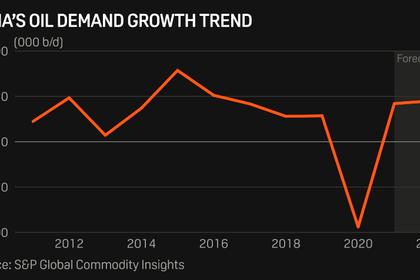
2022, April, 1, 11:20:00
INDIA NEED MORE OIL
We imported from Russia just 0.419 million mt in the April-December period of the current fiscal year 2021-22 (April-March). That is just 0.2% of the total requirement.
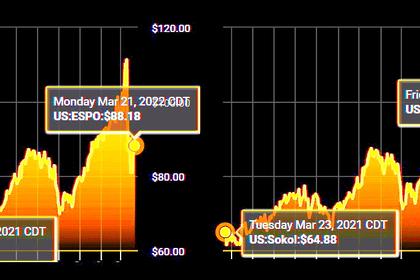
2022, March, 22, 12:45:00
RUSSIA BYPASSES SANCTIONS
"If oil is sold at a discount, then [consumers] will be happy to buy it. We will earn less, but we will be able to place oil," Novak said.
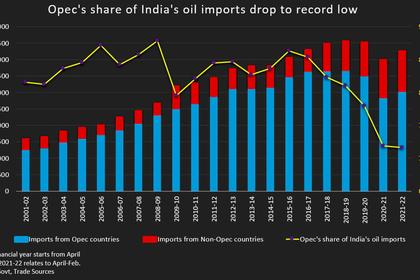
2022, March, 18, 11:30:00
INDIA'S OIL IMPORTS UP
Oil imports by Asia's third-largest economy rose 5% from January and were up 24% from a low base in February 2021, when a refinery at Bathinda in northern India was fully shut for maintenance, data showed.
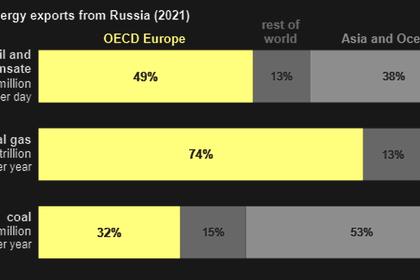
2022, March, 15, 15:20:00
RUSSIA IS A KEY
In 2021, Russia was the largest natural gas-exporting country in the world, the second-largest crude oil and condensates-exporting country after Saudi Arabia, and the third-largest coal-exporting country behind Indonesia and Australia.
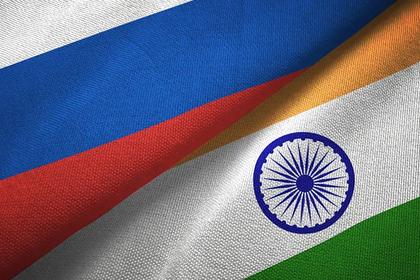
2022, March, 15, 15:10:00
RUSSIA NEED INDIAN INVESTMENT
"Russia's oil and petroleum product exports to India have approached $1 billion, and there are clear opportunities to increase this figure," said Russia's Deputy Prime Minister Alexander Novak, according to a statement shared by Russia's embassy in India late on Friday.
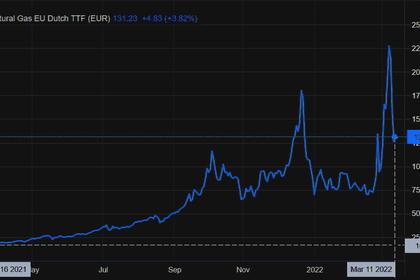
2022, March, 14, 11:50:00
RUSSIA GUARANTEES ENERGY SECURITY
"Russia remains a reliable supplier, a world-class guarantor of energy security. We value this reputation, but are ready for a harsh confrontation in the energy sector, if the need arises,"
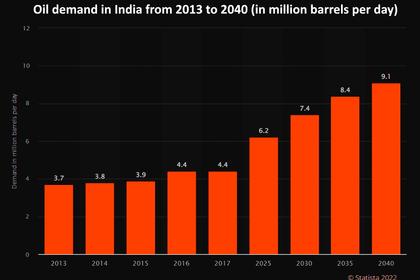
2022, March, 2, 11:15:00
OIL PRICES FOR INDIA
Russia and India in December signed new energy cooperation agreements, including a contract for Rosneft to ship almost 15 million barrels of crude to India in 2022, according to government and company statements.
All Publications »
Tags:
РОССИЯ,
ИНДИЯ,
RUSSIA,
INDIA














